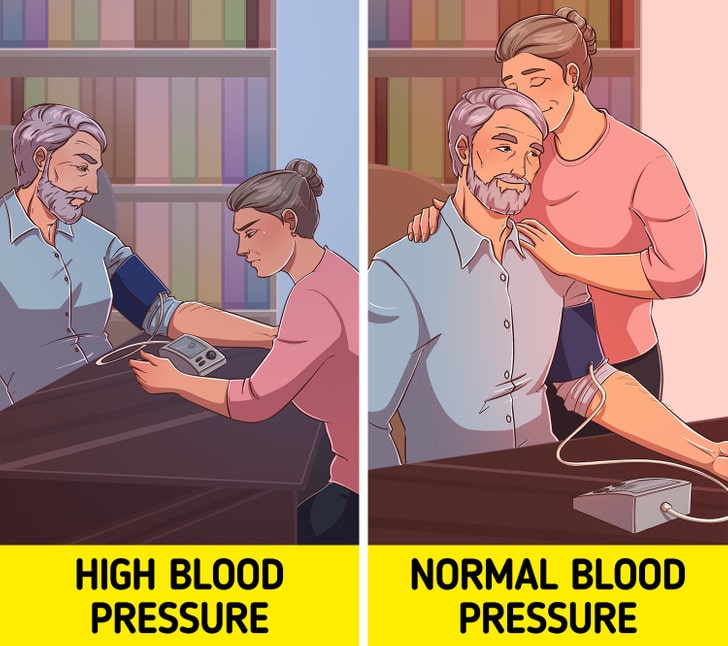Cuddling is more than just a comforting gesture—it has powerful health benefits backed by scientific research. In today’s fast-paced, digitally connected world, the simple act of physical touch can play a crucial role in our overall well-being. This article will explore 5 benefits of cuddling according to science, providing you with insights into how cuddling can improve your health and happiness.
We’ll delve into how cuddling regulates blood pressure, boosts your immune system, makes you feel younger, acts as a natural painkiller, and even helps children become smarter. Along the way, we’ll reference reputable external sources and studies to support these claims.
Cuddling Regulates Blood Pressure and Promotes Cardiovascular Health

One of the most notable benefits of cuddling is its positive impact on blood pressure. When you cuddle with a loved one, your body releases oxytocin, often referred to as the “cuddle hormone.” This hormone plays a significant role in reducing stress and inducing relaxation, which in turn helps to lower blood pressure.
How Cuddling Helps Regulate Blood Pressure
- Oxytocin Release: During a cuddle session, oxytocin levels surge, which helps dilate blood vessels, reducing blood pressure and easing the strain on the cardiovascular system.
- Stress Reduction: Lower stress levels, achieved through the physical and emotional comfort of cuddling, are associated with reduced levels of cortisol—a hormone linked to hypertension and other heart-related issues.
- Improved Heart Health: Regular physical affection can lead to long-term benefits such as a decreased risk of heart disease and improved overall cardiovascular health.
For more detailed information on the connection between physical affection and heart health, visit Harvard Health Publishing.
Cuddling Boosts Your Immune System and Enhances Overall Health
Physical touch, including cuddling, plays an essential role in bolstering your immune system. Scientific studies have shown that regular affectionate touch can increase the levels of certain antibodies and immune cells, making your body more resilient to infections.
The Science Behind Immune System Boosts Through Cuddling
- Enhanced Immunoglobulin Production: Cuddling increases the production of immunoglobulin A (IgA), an antibody that plays a critical role in protecting mucosal surfaces from pathogens.
- Stress Reduction: As mentioned earlier, cuddling reduces cortisol levels. Lower cortisol not only helps with blood pressure but also prevents the suppression of immune function, allowing your body to fend off illnesses more effectively.
- Improved Sleep Quality: The comfort and relaxation derived from cuddling can lead to better sleep quality, which is directly linked to a stronger immune system.
For additional insights on how stress reduction impacts immunity, check out this WebMD article on stress and immunity.
Cuddling Makes You Feel Younger: The Fountain of Youth Through Physical Touch

Aging is a natural process, but the way we age can be influenced by our lifestyle choices. Regular cuddling has been linked to a more youthful feeling, both physically and mentally. The emotional and physiological benefits of cuddling contribute to improved overall well-being, making you feel younger.
Why Cuddling Can Make You Feel Younger
- Reduced Stress and Anxiety: Lower stress levels from physical affection not only help your heart but also keep your mind clear and youthful. Chronic stress is known to accelerate the aging process, so reducing it can have anti-aging benefits.
- Enhanced Mental Health: Regular physical contact stimulates the production of serotonin and dopamine, neurotransmitters that improve mood and reduce feelings of depression and anxiety.
- Improved Skin Health: The boost in circulation from a cuddle session can enhance skin health, promoting a vibrant, youthful appearance. Increased blood flow delivers oxygen and essential nutrients to your skin cells, improving their regeneration process.
For further reading on the anti-aging effects of stress reduction, explore Mayo Clinic’s insights on stress and aging.
Cuddling Acts as a Natural Painkiller and Eases Discomfort
Another remarkable benefit of cuddling is its ability to act as a natural painkiller. The release of oxytocin during physical affection not only reduces stress but also has potent analgesic properties. This means that cuddling can help alleviate various types of pain naturally, without the need for medication.
The Natural Pain-Relieving Effects of Cuddling
- Oxytocin’s Role in Pain Relief: Oxytocin has been found to reduce pain perception by modulating pain signals in the brain. Studies suggest that higher oxytocin levels correlate with decreased pain sensitivity.
- Distraction from Pain: Cuddling diverts your focus from discomfort, providing a mental escape from chronic pain conditions.
- Increased Endorphin Release: The physical and emotional comfort of cuddling can trigger the release of endorphins, which are the body’s natural pain relievers.
For more detailed scientific evidence on the pain-relieving properties of oxytocin, refer to research available on PubMed.
Cuddling Makes Children Smarter: Enhancing Cognitive and Emotional Development
Beyond the benefits for adults, cuddling is vital for the healthy development of children. Numerous studies have shown that physical affection in early childhood can lead to enhanced cognitive abilities and better emotional regulation.
How Cuddling Contributes to Smarter, Healthier Children
- Enhanced Brain Development: Regular physical affection stimulates neural development and helps in building strong connections in the brain. This leads to improved cognitive skills, such as problem-solving and language development.
- Emotional Security: Cuddling provides a sense of safety and security, which is crucial for healthy emotional development. Children who receive ample physical affection tend to exhibit better social skills and lower levels of anxiety.
- Improved Stress Resilience: Early experiences of affectionate touch help children develop a more robust stress response system. This can lead to improved coping mechanisms and better performance in academic and social settings.
For more insights into the benefits of physical affection in early childhood development, visit Zero to Three, a trusted resource on early childhood research.
The Science Behind Cuddling: Why Physical Touch Is Essential for Well-Being
Cuddling is a powerful act that goes beyond simple physical comfort. It engages multiple systems in our body—from our nervous system to our endocrine system—producing a range of beneficial effects. Here’s a closer look at the science that explains why cuddling is so beneficial:
Hormonal Balance: Physical touch increases the levels of oxytocin, serotonin, and dopamine while reducing cortisol levels. This hormonal balance is crucial for mental and physical well-being.
Improved Cardiovascular Health: The calming effect of cuddling can lead to improved cardiovascular health by lowering blood pressure and reducing the risk of heart disease.
Enhanced Emotional Connection: Cuddling fosters a deeper emotional connection between individuals, which can strengthen relationships and contribute to overall life satisfaction.
For more on the role of hormones in health, consider reading this article from the National Institutes of Health (NIH).
How to Incorporate More Cuddling Into Your Daily Life
Understanding the benefits of cuddling is one thing; incorporating it into your daily routine is another. Here are some practical tips to help you enjoy the benefits of physical affection:
Schedule Regular Cuddle Time: Whether with a partner, family member, or even a pet, set aside time each day for physical closeness.
Create a Comfortable Environment: Enhance your cuddle sessions by creating a relaxing atmosphere. Dim the lights, play soft music, and use comfortable pillows or blankets.
Be Present: Focus on the moment and enjoy the emotional and physical connection. Mindfulness can enhance the benefits of cuddling by allowing you to fully experience the release of oxytocin and endorphins.
Encourage Family Cuddles: For parents, make cuddling a part of your family’s daily routine. Not only will it strengthen your bond with your children, but it will also support their cognitive and emotional development.
By making a conscious effort to include more physical affection in your daily routine, you can enjoy these scientifically proven benefits and improve your overall quality of life.
Conclusion: Embrace the Science-Backed Benefits of Cuddling for a Healthier, Happier Life
Cuddling is a simple, natural way to boost your health and happiness. From regulating blood pressure and boosting your immune system to making you feel younger, alleviating pain naturally, and even enhancing children’s cognitive development, the science behind cuddling is compelling. By embracing more physical affection in your life, you’re not just indulging in a comforting habit—you’re investing in your overall well-being.
Key Takeaways:
Regulates Blood Pressure: Cuddling triggers the release of oxytocin, which helps lower blood pressure and improve cardiovascular health.
Boosts the Immune System: Physical touch reduces stress and increases beneficial antibodies, fortifying your body’s defenses.
Promotes Youthfulness: Reduced stress and improved circulation can help you feel younger both mentally and physically.
Natural Pain Relief: Oxytocin and endorphin release during cuddling can ease pain without medication.
Enhances Child Development: Regular physical affection is vital for the cognitive and emotional development of children.
By understanding and harnessing these benefits, you can make small, meaningful changes in your daily routine that have a profound impact on your health. For more information on the science behind cuddling and physical touch, explore additional resources from Harvard Health Publishing and WebMD.
Start incorporating more cuddling into your life today—whether it’s a warm embrace with a loved one, a snuggle on the couch, or quality time with your children. The science is clear: a little extra physical affection can lead to a happier, healthier, and more connected life.
Embrace the power of touch, and let the benefits of cuddling transform your health from the inside out.









Leave a Reply